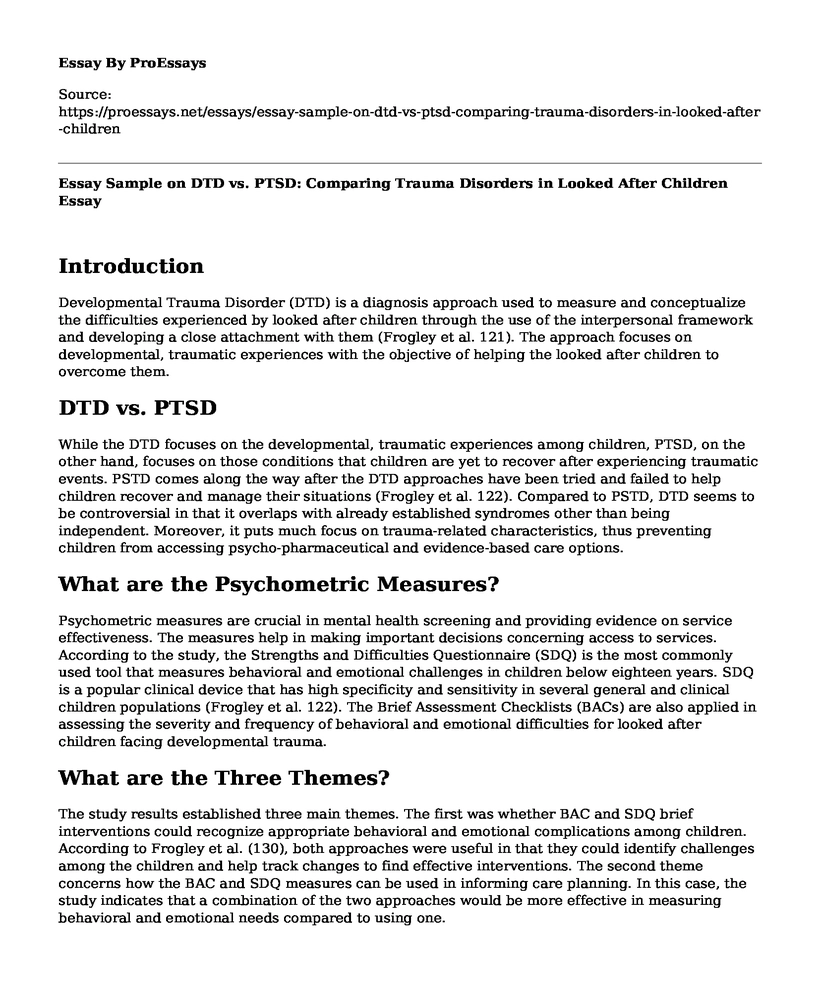Introduction
Developmental Trauma Disorder (DTD) is a diagnosis approach used to measure and conceptualize the difficulties experienced by looked after children through the use of the interpersonal framework and developing a close attachment with them (Frogley et al. 121). The approach focuses on developmental, traumatic experiences with the objective of helping the looked after children to overcome them.
DTD vs. PTSD
While the DTD focuses on the developmental, traumatic experiences among children, PTSD, on the other hand, focuses on those conditions that children are yet to recover after experiencing traumatic events. PSTD comes along the way after the DTD approaches have been tried and failed to help children recover and manage their situations (Frogley et al. 122). Compared to PSTD, DTD seems to be controversial in that it overlaps with already established syndromes other than being independent. Moreover, it puts much focus on trauma-related characteristics, thus preventing children from accessing psycho-pharmaceutical and evidence-based care options.
What are the Psychometric Measures?
Psychometric measures are crucial in mental health screening and providing evidence on service effectiveness. The measures help in making important decisions concerning access to services. According to the study, the Strengths and Difficulties Questionnaire (SDQ) is the most commonly used tool that measures behavioral and emotional challenges in children below eighteen years. SDQ is a popular clinical device that has high specificity and sensitivity in several general and clinical children populations (Frogley et al. 122). The Brief Assessment Checklists (BACs) are also applied in assessing the severity and frequency of behavioral and emotional difficulties for looked after children facing developmental trauma.
What are the Three Themes?
The study results established three main themes. The first was whether BAC and SDQ brief interventions could recognize appropriate behavioral and emotional complications among children. According to Frogley et al. (130), both approaches were useful in that they could identify challenges among the children and help track changes to find effective interventions. The second theme concerns how the BAC and SDQ measures can be used in informing care planning. In this case, the study indicates that a combination of the two approaches would be more effective in measuring behavioral and emotional needs compared to using one.
Moreover, broader measures should be adopted alongside BAC and SDQ to develop more understanding of children, which will, in turn, result in improved outcomes (Frogley et al. 130). The third theme concerns the potential glitches that may arise with the usage of these approaches with the looked after teenagers. The authors note that these two approaches might not be adequately sensitive in categorizing the specific needs of the children in a short time and providing a clear pathway for the children who fail to meet the conditions for mental health diagnosis.
Conclusion
In conclusion, the study found that both the BAC and SDQ alone do not adequately capture the desires of looked-after teenagers. The two approaches require additional measures. This is the main reason why many mental health services did not support the two measures. According to Frogley et al. (132), in working with children whose past lives are hard and puzzling, it is essential to integrate different stakeholders and apply multiple examination tools to understand their conditions fully.
Work Cited
Frogley, Catherine, et al. " They don't meet the stereotypes in the boxes...': Foster carers' and clinicians' views on the utility of psychometric tools in the mental health assessment of looked after children." Adoption & Fostering 43.2 (2019): 119-136.
Cite this page
Essay Sample on DTD vs. PTSD: Comparing Trauma Disorders in Looked After Children. (2023, May 07). Retrieved from https://proessays.net/essays/essay-sample-on-dtd-vs-ptsd-comparing-trauma-disorders-in-looked-after-children
If you are the original author of this essay and no longer wish to have it published on the ProEssays website, please click below to request its removal:
- My Cure for Social Anxiety Disorder
- Case Stude Example of Major Depressive Disorder
- Paper Example on Physiological and Psychological Stress
- PTA Practical Experience Analysis Essay
- "Manage Your Emotional Culture" Article Analysis Essay
- Essay Example on Nursing Student Characteristics: Skills for Future Success
- Examination of Mental Health Reforms from Criminal Justice Perspective - Paper Example







